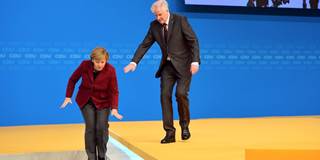After years of blocking eurozone reforms at every turn, German Chancellor Angela Merkel has suddenly come out in favor of a common budget. But the reason is not that she has seen the economic light; it is that she needs help facing down a domestic political rebellion that could very well topple her government.
BERLIN – Divisions within Germany’s ruling coalition over refugees have started to jeopardize Chancellor Angela Merkel’s control of the government. To put down a rebellion launched by her own interior minister, Horst Seehofer of the Bavaria-based Christian Social Union (CSU), Merkel now must secure agreements with other European Union member states to bring order to Europe’s asylum system. And that, in turn, requires German concessions on eurozone reforms.

BERLIN – Divisions within Germany’s ruling coalition over refugees have started to jeopardize Chancellor Angela Merkel’s control of the government. To put down a rebellion launched by her own interior minister, Horst Seehofer of the Bavaria-based Christian Social Union (CSU), Merkel now must secure agreements with other European Union member states to bring order to Europe’s asylum system. And that, in turn, requires German concessions on eurozone reforms.